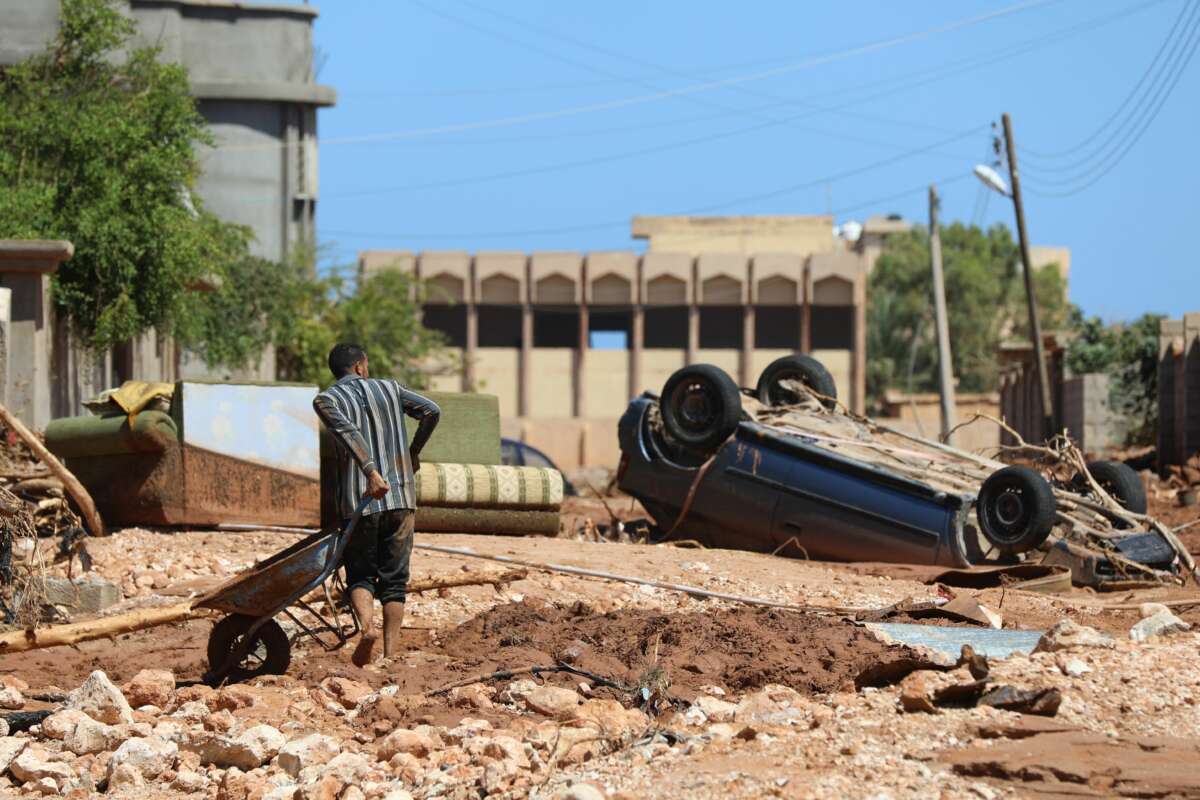Did you know that Truthout is a nonprofit and independently funded by readers like you? If you value what we do, please support our work with a donation.
This story was originally published by Grist. Sign up for Grist’s weekly newsletter here.
Catastrophic flooding earlier this week in Libya killed at least 10,000 people, with more than 30,000 displaced, after Storm Daniel pummeled the coast and two dams broke in quick succession.
Nearly a quarter of Derna, a coastal city in the eastern corner of Libya, was destroyed in the flooding, with entire blocks of buildings now missing and washed out to sea.
Death counts range, reaching estimates as high as 20,000, a number that came from the mayor of Derna. The Libyan Red Crescent put the number slightly lower at more than 11,000, as reported by the Associated Press.
Tropical storms or hurricanes in the Mediterranean are often referred to as “medicanes,” and while these weather events don’t reach speeds fast enough to qualify as official hurricanes, they can be quite destructive. Storms like Daniel are considered rare, and are expected to remain rare, but higher sea surface temperatures fueled by climate change can supercharge medicanes and make them more forceful, according to Kerry Emanuel, a professor emeritus of atmospheric science at the Massachusetts Institute of Technology.
“We expect, actually, to see fewer medicanes in the future, but we expect to see more of the stronger variety of medicanes,” said Emanuel.
Mario Miglietta, a meteorologist with the Italian National Research Council, also pointed out that a unique weather phenomenon called atmospheric blocking might have had a big influence on the path of the storm. A mass of warm air trapped the storm in place, as it gathered energy and intensified.
Storm Daniel is not unprecedented as Ianos, the storm that hit Greece three years ago that also intensified quickly before making landfall. But Miglietta said it’s an area to examine as atmospheric conditions change amid a warmer climate.
“[Atmospheric blocking] was the reason why the cyclone persisted over the same region of the Mediterranean Sea for so long, which is unusual,” said Miglietta.
Another important factor: the crumbling infrastructure in Derna, which led to the failure of two dams known as the Al-Bilad and Abu Mansour Dams. The 50-year-old dams were in need of severe repairs, according to a 2022 study from a researcher at Omar Al-Mukhtar University in Bayda, Libya. The study cited the area as highly prone to flooding, and specifically referred to the need for continued dam maintenance.
But the current political situation in the country left little room for planning. Libya has only recently emerged from a civil war, which started in 2014 and ended in 2020, and is still governed by two official administrations. One is located in the west in Tripoli and has been recognized by the United Nations; the other is in the east in Tobruk, which governs Derna. A number of militias also exercise power over areas of the country, complicating the question of recovery.
This made shoring up infrastructure a difficult task, according to Daniel Aldrich, professor of political science and public policy at Northeastern University in Boston.
“In Libya, it wasn’t that they were just thinking about, ‘OK, what happens if there’s major rains after a long drought because of climate change,’” he told Grist. “They’re also worried about other things, for example: ‘Are there armed parties out there [that] we need to defend ourselves against? How do we handle the possibility of collapse when there’s no clear government going on?’ These are all major problems they’re facing.”
Grist is a nonprofit, independent media organization dedicated to telling stories of climate solutions and a just future. Learn more at Grist.org
Press freedom is under attack
As Trump cracks down on political speech, independent media is increasingly necessary.
Truthout produces reporting you won’t see in the mainstream: journalism from the frontlines of global conflict, interviews with grassroots movement leaders, high-quality legal analysis and more.
Our work is possible thanks to reader support. Help Truthout catalyze change and social justice — make a tax-deductible monthly or one-time donation today.
